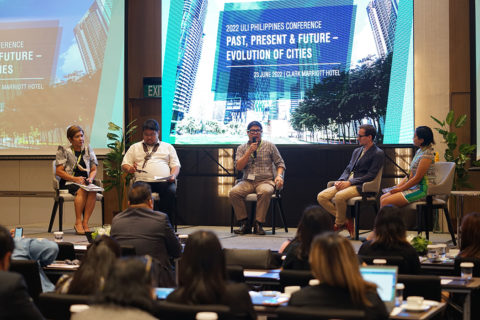Top Story
A Look Back on the 2022 ULI Philippines Conference
With the theme of “Past, Present & Future - Evolution of Cities," the 2022 ULI Philippines Conference returns in-person
Heritage sites in the Philippines have the unfortunate reputation of being subject to calamities, neglect and demolition. However, there has been a growing movement in the country to protect, restore and honor these landmarks and the memories embedded within them.
In an effort to forward the movement, ULI Philippines invited Filipino architect and cultural studies scholar Gerard Rey Lico, Spanish-born architect and Estudio Arkipelago principal Endika Ampudia, renowned Filipino historian Michael Charleston “Xiao” Chua, and Quezon City Tourism Department representative Ma. Teresa Tirona to speak at their 2022 Conference themed “Past, Present & Future – Evolution of Cities”.

Held at New Clark City on June 23 (Thursday) and moderated by the officer-in-charge of the Business Management Division in Intramuros Sheena Botiwey, the session began with short presentations from Archs. Lico and Ampudia on the significance of honoring and maintaining the Philippines’ unique built history.
“When we talk of heritage, heritage is something of value that we pass onto the next generation […] A space is nothing if it doesn’t have memory and memory is defined by the history and the past of a place”, said Lico to explain his personal commitment to the craft of historic preservation.
“Places are essentially centers of meaning, constructed out of lived experience that through time would be perceived as significant to the lives of people”, he added.
Losing these places, according to Lico, is tantamount to losing one’s memories and emotional attachment of the place.
Hence, his personal advocacy for historic preservation, which is evident in his hometown of Valenzuela where he is closely involved in pursuing the rehabilitation of neglected historical architecture such as the city’s Arkong Bato and fishing village.
He was also involved in the pedestrianization of Fatima Avenue, a pilgrimage site in Valenzuela City, where he tried to reclaim the street life and encourage alternative transport (i.e., walking, bicycling) – sharing that because of the change, “A new civic life is created”.
“Heritage now is becoming a byword especially among the millennials and the Gen Z because they need something physical to cling to and heritage provides that physicality”, he said. “Because nowadays, especially in the pandemic, all of our activities are mediated by the digital world. We pass our day by through the screens and we need tangible spaces to express our identity as a people and as a community.”
Meanwhile, Ampudia shared that despite his Spanish roots, Filipino architecture is not purely the result of Spanish influence (or any other external influence); rather he asserted that historic Filipino buildings are distinct to the Philippines.
In examining the design of one of the oldest Churches in the country, the San Agustin Church in Intramuros, Ampudia noted that although it is made out of stone and has a square floor plan common in Spanish architecture, these may have been done out of practicality instead to protect against earthquakes and fires.
He also cites the existence of historic octagonal Filipino buildings, much in the style of the Chinese pagodas, as a distinctly Filipino historic asset which is not recognizable in Spanish architecture.
“We must preserve our Filipino heritage because it’s something unique to the Philippines, it’s not a matter of what the colonizers left or what the colonizers influenced. It’s something that we all should take care of because it’s actually part of our Filipino identity”, he said.
“It’s like a history book. If you scrap some papers, the book is always incomplete”, he concluded.
During the panel discussion, Lico clarified that in the process of historic preservation, “Modernization is not technically the enemy of heritage building”.
He cited his work at the Rizal Memorial Coliseum as an example for integrating traditional structures with modern-day sensibilities. For the project, he had to install air conditioning and lighting systems, and transform it into a potential multipurpose space.
The project proved to be successful when the arena was eventually turned into a quarantine facility at the height of the pandemic.
These choices, he said, are compromises to help prolong the life of historic assets and allow more generations to appreciate these structures.
Meanwhile, for Chua, these cities and places become special because of the stories embedded within them.
When he looks at a city as a historian, he says “I begin with kasaysayan. Kasaysayan came from the word saysay, which are stories and it’s also importance, relevance, the use. […] I’m searching for saysay”.
He championed local history as a means of truly understanding a place, citing the example of the seemingly shallow Macahambus Cave in Cagayan de Oro, where the Filipinos hid from their Spanish invaders within a hidden cave system and resulted in one of the few victories during the Philippine–American War.
Likewise, Quezon City tourism rep. Tirona forwarded the enrichment of knowing the background of local heritage sites, promoting the city’s prominent spots such as the Israel-Philippine Friendship Park located at Quezon Memorial Circle, which is to soon undergo extensive redevelopment.
The park also houses the Quezon Heritage House, which boasts the signatures of the 1,200 Jews saved by the late President Manuel Quezon during the Second World War.
Tirona said that in creating these opportunities for historic preservation, public policy should actively be at its forefront and should actively support these heritage sites.
According to Ampudia, the pandemic which has isolated people into their homes has also allowed people to rethink where they spend their time outdoors.
Ampudia concluded the panel by saying, “The way that things were done in the past is not just random. It’s something that was thought of for centuries […] So, if some of those strategies were adopted in modern developments, I think we will be better off and that will be our way forward”.
Don’t have an account? Sign up for a ULI guest account.